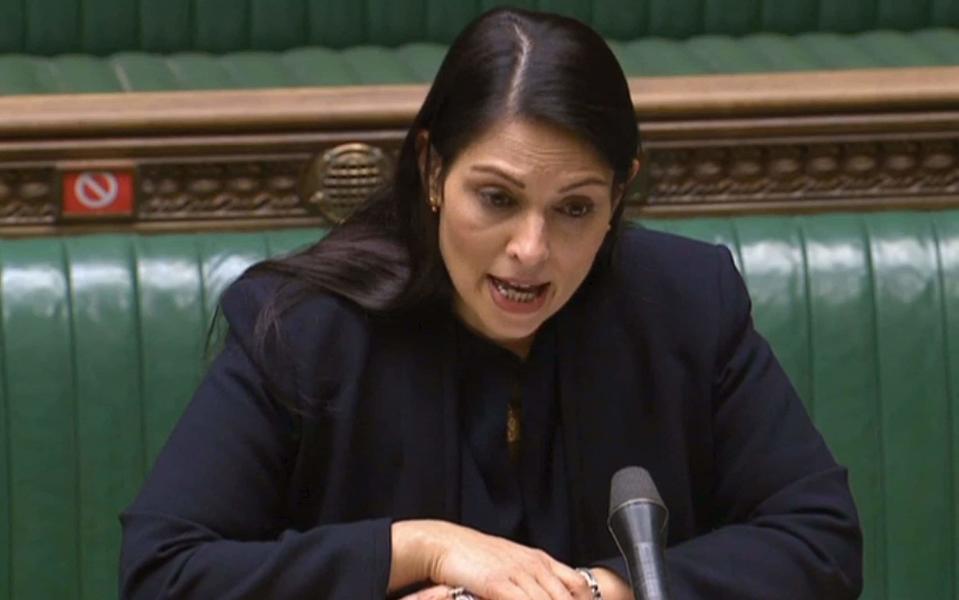Cats to be microchipped by law in Government crackdown on pet thefts

- Oops!Something went wrong.Please try again later.
All 10 million cats in the UK are to be microchipped by law after thefts soared by 12 per cent in a year, The Telegraph has learned.
Police figures show that the number of cats being stolen has risen by 12.3 per cent during the Covid pandemic and nearly three-fold in five years as the value of the most expensive breeds surged to £2,000.
Owners will be required to microchip their cats – as dogs already are – so they can be tracked and identified if stolen and resold, with fines of up to £500 for people who fail to do so.
Watch: Teenager makes bow ties for shelter dogs to help them get adopted
The move is expected to be part of a package of measures taken by a ministerial taskforce, set up by Robert Buckland, the Justice Secretary, with Priti Patel, the Home Secretary, and George Eustace, the Environment Secretary, to combat the growing black market in stolen pets.
Dog theft is also up by a fifth in a year as more than two million people bought pets for the first time in the pandemic.
Ministers are considering a ban on cash purchases of pets to stamp out black market sales by creating a paper trail for investigators.

Thieves could face tougher sentences as courts get powers to give more weight to the emotional impact of a theft on an owner. At present, sentencing guidelines primarily base penalties on the financial value of a dog or cat, which campaigners say often leads to paltry fines of less than £300.
"There is a thriving black market in cash sales of animals, no questions asked. A cash ban is appealing because we know it crippled the stolen scrap metal industry and microchipping is absolutely central to the way in which animals' welfare is maintained," said a senior Government source.
Vets could be required by law to scan cats and dogs for chips when the animals are treated and/or put down to help stamp out the trade in illegally-bought pets.
Three-quarters of cat owners have already chipped their pets, but that means 2.6 million cats are still not microchipped. Eight out of 10 cats at the Battersea Dogs and Cats Home are unchipped.
Pedigree cats are targeted by thieves for breeding or resale if found to be neutered, with Bengal, Siamese, British shorthair and Maine Coon the most often stolen, says Pet Theft Awareness, which used freedom of information requests to compile the police figures.
Pedigree kittens fetch £500 and Bengal cats, the most stolen, command £2,000. Popular dog breeds such as bulldogs fetch £4,000 and a stolen litter could net a thief up to £20,000.
Watch: What UK government COVID-19 support is available?
Sir Iain Duncan Smith, the former Conservative Party leader, is campaigning with 50 Conservative MPs for a crackdown to be included in the new policing bill.
He said: "The thieves can make a lot of money with little penalty. They will gamble that if they can make £15,000 in a day, a £250 fine is not a problem."
Mr Duncan Smith said he wanted an immediate ban on cash sales of pets, tougher sentences ending the anomaly where dogs and cats were treated as "chattels," controls on internet advertising of pets, scanning of chipped dogs and cats by vets and a return of dog licences.
Daniel Allen, an animal geographer at Keele University, said there were flaws in the current chipping system with multiple different databases and lack of scanning.
"Compulsory microchipping certainly has the potential to improve the identification and reunification of missing and stolen pets, but this potential can only be met if the current system is fixed. Optional scanning and competing commercial databases are currently letting down microchipped pets and their responsible owners," he said.
"With this in mind, compulsory cat chipping presents an excellent opportunity for the government to work towards compulsory scanning by animal professionals and councils, and a single accessible register for cats and dogs."
Jacqui Cuff, head of advocacy and Government relations at Cats Protection, welcomed moves to chip cats, saying a 40 per cent rise in the price of cats and growing demand for pets during lockdowns had fuelled a rise in thefts.

